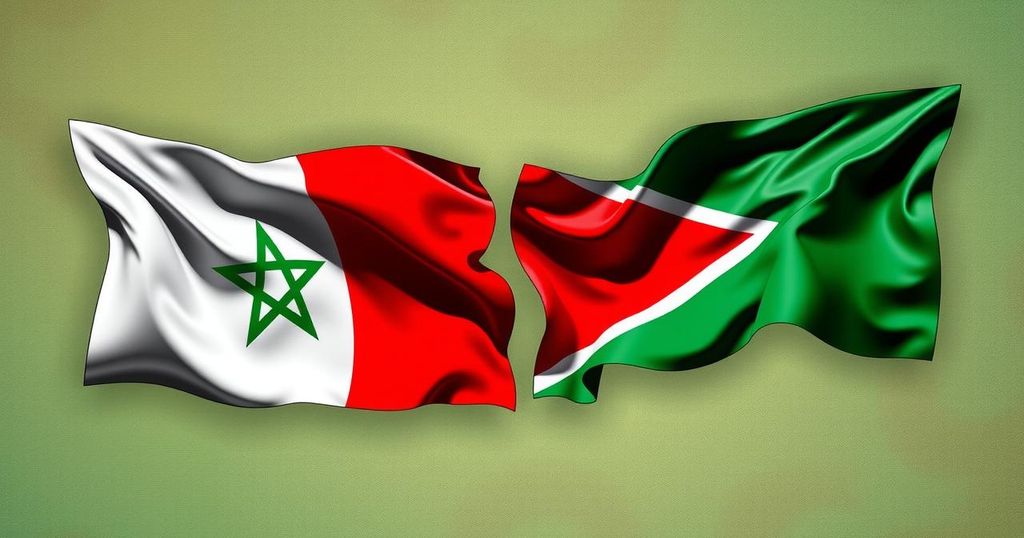Strategic Dynamics in Moroccan-Mauritanian Relations: A Path to Regional Cooperation
The strategic relationship between Morocco and Mauritania has gained prominence, particularly since the onset of the Western Sahara conflict. Recent diplomatic engagements have improved ties, highlighting cooperation in security and economic development amidst pressures from regional actors. Their alliance underscores the potential for collaborative initiatives that address regional challenges, enhance stability, and foster economic growth, setting a model for African regional integration.
The strategic relationship between Morocco and Mauritania has evolved against the backdrop of significant geopolitical dynamics in the Maghreb region, particularly since the Moroccan Western Sahara conflict escalated. This pivotal situation positions Mauritania as a vital player due to its geographic proximity to both Algeria and Morocco. Observers have recently noted an improvement in relations marked by the meeting between King Mohammed VI and Mauritanian President Mohamed Ould Ghazouani, which reflects a warming of diplomatic interactions aimed at addressing mutual interests and challenges.
Morocco and Mauritania share a rich history characterized by strategic cooperation that substantially influences security, stability, and development in North and West Africa. This partnership is underpinned by collaborative efforts in cultural, economic, political, and security dimensions, addressing contemporary obstacles while capitalizing on future opportunities. As neighbors, they are united in confronting common security threats such as terrorism, organized crime, and illegal migration, all stemming from their geographical alignment within the Sahel-Sahara region.
Geographically, Mauritania is situated strategically between Algeria and the Moroccan Sahara, complicating its relationships due to Algerian pressure that seeks to counter Morocco’s influence. However, Mauritania has maintained a position of neutrality in the Western Sahara dispute, focusing instead on fostering a new political climate through joint initiatives such as the gas pipeline project aimed at connecting Nigeria and West African nations to Europe. These initiatives highlight the potential for collaboration in mitigating the political complexities between Morocco and Algeria while enhancing trade prospects.
The essence of the Moroccan-Mauritanian alliance emphasizes regional integration and sustainable development. Morocco’s southern provinces are being developed under a vision articulated by King Mohammed VI to transform them into an economic corridor linking Africa and Europe. Projects such as the Atlantic maritime port of Dakhla are pivotal in this context, enhancing maritime connectivity and fostering an environment conducive to investment and trade. For Mauritania, this partnership provides avenues to expand economic ties and access broader global markets through collaborative frameworks.
This strategic collaboration transcends economic development; it embodies coordinated security efforts to establish a balanced regional power dynamic. Both states are committed to joint initiatives aimed at regional security, which include addressing non-traditional threats like arms trafficking and terrorism. Enhanced military cooperation can also lay the foundation for broader alliances across West Africa, establishing a unified security approach.
Looking ahead, the Moroccan-Mauritanian relationship exemplifies a model of cooperative regionalism that combines strategic vision with shared interests. Initiatives such as the Atlantic Gas Pipeline reflect the potential of this partnership to foster innovative solutions for the region. Under King Mohammed VI’s leadership and in conjunction with regional partners like Mauritania, there arises an opportunity to create a template for African cooperation that promotes stability and growth across the continent.
The relationship between Morocco and Mauritania is steeped in historical significance and is increasingly vital in the context of regional geopolitical dynamics. The onset of the Western Sahara conflict has catalyzed Mauritania’s involvement in regional peace discussions, as it finds itself geographically positioned between influential players such as Algeria and Morocco. The evolving political landscape, marked by pressures from Algeria, underscores the need for a balanced approach towards regional collaboration, particularly in addressing shared threats and fostering economic integration.
In summary, the Moroccan-Mauritanian alliance symbolizes a promising avenue for regional cooperation characterized by shared interests and strategic collaboration. Emphasizing economic development, security cooperation, and diplomatic dialogue, this partnership holds the potential to reshape the geopolitical landscape of North Africa. Continued commitment to mutual development and a unified strategic framework will be essential for both nations as they endeavor to navigate current challenges and foster a more integrated and prosperous future for the region.
Original Source: moderndiplomacy.eu




Post Comment